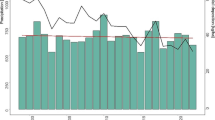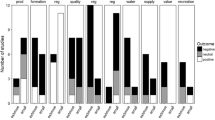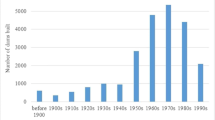Abstract
Economic ideas and processes are becoming increasingly integrated with more traditional engineering and hydrologic models of water management problems. Combining economic management concepts and performance indicators with an engineering-level of understanding of a hydrologic system can provide results and insights more directly relevant for water management decisions and policies. When such models are developed and used with involvement of stakeholders, they can become a basis for shared understanding of water problems as a foundation for negotiated management and policy solutions. When implemented with optimization software, integrated hydro-economic models also can suggest promising innovative solutions for policy-makers to consider. Their applications to river basin management problems are reviewed. Economic and integrated economic-engineering-hydrologic modeling is then discussed in the context of the evolving European Water Framework Directive. Relevant items are cost recovery and water pricing, cost-effectiveness of water management measures, and public participation in decision processes.
Similar content being viewed by others
References
Aftab A, Hanley N (2004) Combining economic instruments with regulation to achieve dual environmental targets: nitrate pollution and minimum river flows, In: Applied environmental economic conference. ENVECON 2004. The Royal Society, London. http://www.eftec.co.uk/home.php?section=8&uknee=2)
Andreu J, Capilla J, Sanchís E (1996) AQUATOOL, a generalized decision support system for water-resources planning and management. J Hydrol 177:269–291
Andreu J, Pulido-Velazquez M, Collazos G (2005) Methodology and tools for integrated assessment of resource and environmental costs. In: Second international workshop on implementing economic analysis in the water framework directive. Paris, France, pp 17–18 (February)
Andreu J, Solera A, Paredes J, Sanchez S (2006) Decision support systems for integrated water resources planning and management. In: International workshop on “Hydro-economic modelling and tools for the implementation of the EU water framework directive.” Valencia, Spain, pp 30–31 (Jan 2006)
AQUAMONEY (2006) http://www.aquamoney.org/
Assimacopoulos D, Barraque D, Berland J-M, Feinerman E, Katsiardi P, Manoli E (2005) Estimation of the level of cost recovery of different scenarios of water allocation in arid areas. An easy-to-implement approach. In: Second international workshop on implementing economic analysis in the water framework directive (Seine-Normandy Water Agency and the Directorate of Environment of the EU Commission). Paris, France, 17–18 (Feb)
Bazzani GM, Di Pasquale S, Gallerani V, Viaggi D (2004) Irrigated agriculture in Italy and water regulation under the European Union water framework directive. Water Resour Res 40, W07S04, doi 10.1029/2003WR002201
Bish R (1982) Governing Puget Sound. Sea Grant. Seattle, Washington
Blanco M, Iglesias E, Sumpsi JM (2004) Environmental and socioeconomic effects of water pricing policies: key issues in the implementation of the water framework Directive. In: 13th annual EAERE conference. Budapest, Hungary
Booker JF, Young RA (1994) Modeling intrastate and interstate markets for Colorado River water resources. J Environ Econ Manage 26:66–87
Braden JB (2000) Value of valuation: introduction. J Water Resour Plan Manage 126(6):336–338
Briscoe J (1996) Water as an economic good. The idea and what it means in practice. In: Proceedings of the world congress of the International Commission on Irrigation and Drainage (ICID). Cairo, Egypt
Brouwer R (2004) The concept of environmental and resource cost. Lessons learned from ECO2. In: Brouwerand R, Strosser P (eds) Environmental and resource cost and the water framework directive. An overview of European practices. RIZA Working Paper 2004. 112x, Amsterdam, Holland
Burke SM, Adams RM, Wallender WW (2004) Water banks and environmental water demands: case of the Klamath project. Water Resour Res 40:W09S02, doi:10.1029/2003WR002832
Cai X, McKinney DC, Lasdon LS (2003) Integrated hydrologic–agronomic–economic model for river basin management. J Water Resour Plan Manage 129(1):4–17
Cai X, Rosegrant MW (2004) Optional water development strategies for the Yellow River Basin: balancing agricultural and ecological water demands. Water Resour Res 40(4), doi:10.1029/2003WR002488
CHJ (Júcar Water Agency) (2005) Provisional Art. 5 Report Pursuant to the Water Framework Directive. Confederación Hidrográfica del Júcar, Ministry of Environment, Spain
Deronzier P, Feuilette S, Chegrani P (2005) Environmental costs: from theory to practice in France. In: Second international workshop on implementing economic analysis in the water framework directive. Paris, France, pp 17–18 (February)
Dinar A, Mody J (2004) Irrigation water management policies: allocation and pricing principles and implementation experience. Nat Resour Forum 28(2):112–122
Dirksen F (2004) Beyond linking model systems. In: Heinz I, Nagandla K, Dirksen F (eds) Expert meeting on economics in water management models, Copenhagen, Denmark, pp 15–16 (November) http://hit.infu.uni-dortmund.de/login.html, userid: Copenhagen, password: EconoMod
Dirksen PW, Blind MW, Bomhof T, Nagandla K (2005) Proof of concept of OpenMI for visual DSS development. In: MODSIM05 Conference, Australia
Disco C (2002) Remaking nature: the ecological turn in dutch water management. Sci Technol Human Values 27(2):206–235 (Spring)
Draper AJ, Jenkins MW, Kirby KW, Lund JR, Howitt, RE (2003) Economic-engineering optimization for California water management. J Water Resour Plan Manage 129(3):155–164
Dupuit J (1844) De la mesure de l’utilité des travaux publics. Annales des Ponts et Chaussées, Memoirs et Documents, 2nd ser. 8(2):332–375
Elelund RB, Hebert RF (1999) The secret origins of modern microeconomics: dupuit and the engineers. University of Chicago Press. Chicago, Illinois
EU Commission (2000) Directive 2000/60/EC of the European Parliament and of the Council, of 23 October 2000, establishing a framework for Community action in the field of water policy. Official Journal of the European Economics L 327/1,22.12.2000: http://europa.eu.int/comm/environment/water/water-framework/index_en.html
Frontinus SJ (97a.d.) The water supply of the City of Rome (translation by C. Herschel)
Garcia S, Reynaud A (2004) Estimating the benefits of efficient water pricing in France. Resour Energy Econ 26(1):1–25
Gömann H, Kreins P, Kunkel R, Wendland F (2005) Model based impact analysis of policy options aiming at reducing diffuse pollution by agriculture – a case study for the river Ems and a sub-catchment of the Rhine. Environ Model Softw 20(2):261–271
Görlach B, Interwies E (2004) Assessing environmental and resource costs in the water framework directive: the case of Germany. In: Ecologic – Institute for International and European Environmental Policy. Berlin, Germany. http://www.ecologic.de/download/projekte/1950–1999/1970-01/erc_germany.pdf/
Gomez-Limon JA, Riesgo L (2004) Water pricing: analysis of differential impacts on heterogeneous farmers. Water Resour Res 40, W07S05, doi:10.1029/2003WR002205
Gorelick SM (1983) A review of distributed parameter groundwater management modeling methods. Water Resour Res 19(2):305–319
Griffin RC (2005) Water resource economics. The analysis of scarcity policies and projects. MIT, Cambridge, Massachusetts, USA, p 402
HarmoniCOP (2005) Harmonising collaborative planning. Improving participation in water management, http://www.harmonicop.info/HarmoniCOPHandbook.pdf
HarmoniQuA (2006) Harmonising quality assurance in model based catchment and river basin management. In: Final report of the research project funded by the European Commission, http://www.HarmoniQuA.org/
HEC (1996) Application of HEC-PRM for seasonal reservoir operation of the Columbia River System, Report RD-43, Army Corps of Engineers, Hydrologic Engineering Center, Davis, California
Heinz I (2004) Sustainable farming as a result of negotiations: an analysis at European level, 7th Inter-Regional Conference on Environment-Water. In: 2004 CIGR international conference. International Commission of Agricultural Engineering. Beijing, China, pp 11–14(October) http://www.infu.uni-dortmund.de/english/Co-workers/Ingo.Heinz
Heinz I (2005) How can the WFD cost categories made more feasible? Second International Workshop on Implementing Economic analysis in the Water Framework Directive, Paris pp 17–18 (February) http://www.infu.uni-dortmund.de/english/Co-workers/Ingo.Heinz
Heinz I (2006) The economic value of water, paper and presentation prepared for the international workshop on “Hydro-economic Modeling and Tools for the Implementation of the European water framework directive.” Valencia, pp 30–31 (January) http://www.infu.uni-dortmund.de/english/Co-workers/Ingo.Heinz
Interwies E, Kraemer RA et al (2004) Basic principles for selecting the most cost-effective combination of measures for inclusion in the program of measures as described in article 11 of the water framework directive. UBA – Texte 24/04. Ecologic. Berlin, Germany
Jacobs J, Freeman G, Grygier J, Morton D, Schultz G, Staschus K, Stedinger J (1995) SOCRATES: a system for scheduling hydroelectric generation under uncertainty. Ann Oper Res 59:99–133
Jenkins MW, Lund JR (2000) Integrated yield and shortage management for water supply planning. J Water Resour Plan Manage 126(5):288–297
Jenkins MW, Draper JD, Lund JR, Howitt RE et al (2001) Improving California water management: optimizing value and flexibility, Center for Environmental and Water Resources Engineering, Report no.01-1, University of California, Davis, California, USA
Jenkins MW, Lund JR, Howitt RE, Draper AJ, Msangi SM, Tanaka SK, Ritzema RS, Marques GF (2004) Optimization of California’s water system: results & insights. J Water Resour Plan Manage 130(4):271–280
Jensen RA, Krejcik J, Malmgren-Hansen A, Vanecek S, Havnoe K, Knudsen J (2002) River basin modelling in the Czech Republic to optimise interventions necessary to meet the EU environmental standards. In: Proceedings of the international conference of basin organisations, Madrid, Spain, pp 4–6 (November)
Jöborn A, Danielsson I, Arheimer B, Jonsson A, Larsson MH, Lundqvist LJ, Löwgren M, Tonderski K (2005) Integrated water management for eutrophication control: public participation, pricing policy, and catchment modeling. Ambio XXXIV(7):482–488
Krejcik A (2004) River basin modelling in the Czech Republic-2. In: Expert meeting on economics in water management models, Copenhagen, Denmark, pp 15–16 (November), http://hit.infu.uni-dortmund.de/login.html, userid: Copenhagen, password: EconoMod
Lee DJ, Howitt RE (1996) Modeling regional agricultural production and salinity control alternatives for water quality policy analysis. Am J Agric Econ 78:41–53
Lefkoff J, Gorelick SM (1990) Simulating physical processes and economic behavior in saline, irrigated agriculture: model development. Water Resour Res 26(7):1359–1369
Loucks P (1990) Analytical aid to conflict management. In: Viesssman W, Smerdon ET (eds) Managing water-related conflicts: the engineers role. ASCE, New York, pp 23–37
Lund JR, Ferreira M (1996) Operating rule optimization for the Missouri River Reservoir System. J Water Resour Plan Manage 122(4):287–295
Lund JR, Palmer RN (1997) Water resources system modelling for conflict resolution, Water Resources Update, n. 108. Universities Council on Water Resources (UCOWR). Carbondale, Illinois, US
Maestu J, Andreu J, Gomez CM (2004) Practical experiences in Spain. In: Brouwer R, Stosser P (eds) Environmental and resource cost and the water framework directive (An overview of European practices). RIZA Working Paper 2004. Amsterdam, Holland, p 112x
McCarl BA, Dillon CR, Keplinger KO, Williams RL (1999) Limiting pumping from the Edwards Aquifer: an economic investigation of proposals, water markets, and spring flow guarantees. Water Resour Res 35(4):1257–1268
Martinez Y, Albiac J (2004) Agricultural pollution control under Spanish and European environmental policies. Water Resour Res 40, W10501, doi:10.2005/2004WR003102
Mejías P, Varela-Ortega C, Flichman G (2004) Integrating agricultural policies and water policies under water supply and climate uncertainty. Water Resour Res 40, W07S03, doi 10.1029/2003WR002877
MMA (2002) Análisis Económico del Plan de Cuenca del Cidacos. Ministerio de Medio Ambiente-Gobierno de Navarra
Morris J (2004) Economics and the water framework directive: purpose, principles and practice. In: Applied Environmental Economic Conference, ENVECON 2004 (http://www.eftec.co.uk/home.php?section=8&uknee=2). The Royal Society, London
Pahl-Wostl C (2002) Participative and stakeholder-based policy design, evaluation and modelling processes. Integrated Assessment 3(1):3–14
Palmer Richard N, Werick William J, MacEwan Allison, Woods Andrew W (1999) Modeling water resources opportunities, challenges and trade-offs: the use of shared vision modeling for negotiation and conflict resolution. In: ASCE conference proceedings
Pretty JN, Mason CF, Nedwell DB, Hine RE, Leaf S, Dils R (2003) Environmental cost of freshwater eutrophication in England and Wales. Environ Sci Technol 37(2):201–208
Pulido-Velazquez M (2003) Economic optimization of the management of conjunctive use of surface and groundwater in a water resources system. Contribution to the economic analysis proposed by the European water framework directive. PhD dissertation (in Spanish), Technical University of Valencia, Spain
Pulido-Velazquez M, Jenkins MW, Lund JR (2004) Economic values for conjunctive use and water banking in Southern California. Water Resour Res 40(3) March
Pulido-Velazquez M, Andreu J, Sahuquillo A (2006) Economic optimization of conjunctive of surface and groundwater at the basin scale. J Water Resour Plan Manage 132(6)
Raiffa H (1984) The art and science of negotiation. Harvard University Press, Cambridge, Massachusetts
Rogers P, Bhatia R, Huber A (1998) Water as a social and economic good: how to put the principles into practice. In: Global Water Partnership, TAC Background Paper n.2. Stockholm, Sweden
Rogers P, de Silva R, Bhatia R (2002) Water is an economic good. How to use prices to promote equity, efficiency and sustainability. Water Policy 4(2002):1–17
Shortle JS, Dunn JW (1986) The relative efficiency of agricultural source water pollution control policies. Am J Agric Econ 68:668–677
Spulber N, Sabbaghi A (1998) Economics of water resources: from regulation to privatization. Kluwer, Boston, Massachusetts
Strosser P (2004) The economic elements of the EU water framework directive, expert meeting on economics in water management models, Copenhagen, Denmark, pp 15–16 (November), http://hit.infu.uni-dortmund.de/login.html, userid: Copenhagen, password: EconoMod
U.S. Water Resources Council (1983) Economic and environmental principles and guidelines for water and related land resources implementation studies. U.S. Government Printing Office, Washington, District of Columbia. Available at http://www.wrsc.usace.army.mil/iwr/pdf/p&g.pdf
Van der Veeren RJHM, Tol RSJ (2001) Benefits of a reallocation of nitrate emission reductions in the Rhine River Basin. Environ Resour Econ 18:19–41
Van der Veeren R (2005) In pursuit of optimal measure packages. Dutch Handbook on cost-effectiveness analysis for the EU water framework directive. Ministerie van Verkeer en Waterstraat. The Netherlands
WATECO (2002) Economics and the environment. The implementation challenge of the water framework directive. A guidance document. Working group for WFD economic studies
Watkins DW, McKinney DC (1999) Screening water supply options for the Edward aquifer region in Central Texas. J Water Resour Plan Manage 125(1):14–24
Westen S, Fortune D, Gregersen J (2004) OpenMI – New opportunities for model developers. In: Liong, Phoon and Babovic (eds) 6th international conference on Hydroinformatics – World Scientific Publishing Company, ISBN 981-238-787-0
Winpenny JT (2003) Financing water for all. Report on the World Panel on Financing Water Infrastructure, World Water Council. 3rd World Water Forum and Global Water Partnership
Young RA (2005) Determining the economic value of water. Resources for the Future, Baltimore, Maryland
Young HP, Okada N, Hashimoto N (1982) Cost allocation in water resources development. Water Resour Res 18:463–475
Author information
Authors and Affiliations
Corresponding author
Rights and permissions
About this article
Cite this article
Heinz, I., Pulido-Velazquez, M., Lund, J.R. et al. Hydro-economic Modeling in River Basin Management: Implications and Applications for the European Water Framework Directive. Water Resour Manage 21, 1103–1125 (2007). https://doi.org/10.1007/s11269-006-9101-8
Received:
Accepted:
Published:
Issue Date:
DOI: https://doi.org/10.1007/s11269-006-9101-8




